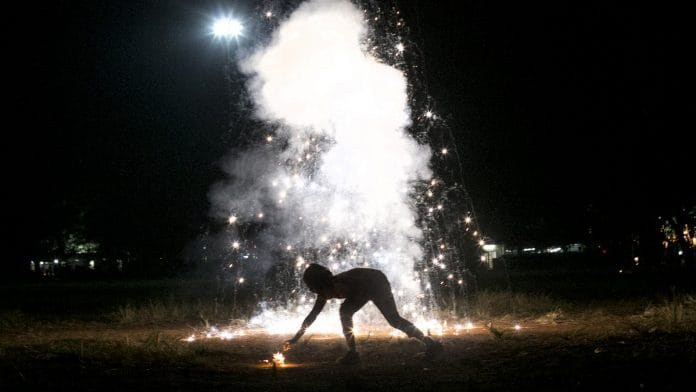Top court has allowed bursting of crackers between 8 pm and 10 pm on Diwali in view of rising air pollution in Delhi-NCR.
New Delhi: Health experts have welcomed the Supreme Court order allowing a two-hour window to burst firecrackers in Delhi-NCR on Diwali night, saying it can help change the “mindset” of people.
The apex court order, allowing bursting of crackers between 8 pm and 10 pm, is aimed at reducing air pollution in the national capital, which turns into a virtual gas chamber at this time of the year.
On 9 October last year, the top court temporarily banned the sale of firecrackers ahead of Diwali.
“It is a welcome step and this will help devise more ways of celebrating a pollution-free Diwali,” Dr Vikas Maurya, senior consultant, pulmonology, Fortis Healthcare, told ThePrint.
Also read: SC refuses blanket ban on crackers, fixes 2-hour time period for bursting them on Diwali
“During winter, air pollution level remains high due to multiple factors. Last Diwali, the level of particulate matter (PM 10) had gone up to 1,000 micron,” he said.
On Christmas and New Year, the firecrackers will be allowed from 11.45 pm to 12.45 pm.
In Delhi-NCR, firecrackers can be burst only in areas designated by the Central Pollution Control Board.
Health risks
In the past three years, the footfall of patients with respiratory problems has seen an increase in hospitals and clinics in the capital. The sale of anti-pollution masks and air-purifiers has also gone up in Delhi and neighbouring states.
“This Diwali, we will have to monitor pollution levels. If stubble burning continues, then this will cause more pollution,” Maurya said.
“However, the court’s order will be beneficial depending on how strictly it is implemented,” Maurya added.
Health experts also recommended that the high-risk patients who are allergic to pollution such as elderly people, pregnant women and those with respiratory problems must stay indoors and wear anti-pollution masks.
“People with respiratory diseases such as COPD, asthma and acute respiratory tract infections must consult doctors and take medication,” said Dr I.M. Chugh, associate director, pulmonology, Max Super Speciality Hospital, Shalimar Bagh.
While putting a time-limit on bursting firecrackers will certainly help reduce air pollution, the government also needs to take long-term measures that would help clean the air, Chug said.
Also read: Is partial firecracker ban enforceable to fix Delhi air or will it fail like last Diwali?
“Air pollution is high during Diwali because it is firstly a change of season — from summer to winter. Secondly, stubble burning, traffic and pollution of factories are other aspects that need to be taken care of,” added Chugh.
The court has also put a curb on online sale of firecrackers.






